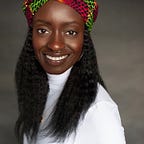What I (Used to) Have in Common with Senator Tim Scott — and Why Black People Too Should be Anti-Racist
I used to get called an “Oreo” regularly. It’s an offensive term that a lot of white people don’t realize is offensive. It means that a person can look Black on the outside, but on the inside everything about the person is white cultured — speech, dress, where you live, who you love, etc. I hated that term, but I hated it because people weren’t entirely wrong. Let me explain.
My parents are from Ghana, West Africa. I was born and raised in the U.S. and we lived in a small town called Palmyra, PA, right next to Hershey, PA. It was a 98% white town. I was the only Black person in my high school senior class, and almost always the only Black person in every grade. All my friends were white. All the guys I dated were white. Everything I learned in school was white-washed. I was living in segregation and didn’t realize it. I was completely immersed into white culture. I wanted straight hair. I wanted mixed babies. I had thought about bleaching my skin from time to time. It really was as if I was the vanilla ice cream dipped in chocolate like a Magnum ice cream bar.
I knew absolutely nothing about Black American culture. But as a Black girl in America, I still had my own unique experience of what it meant to be Black in America. I knew when someone…
